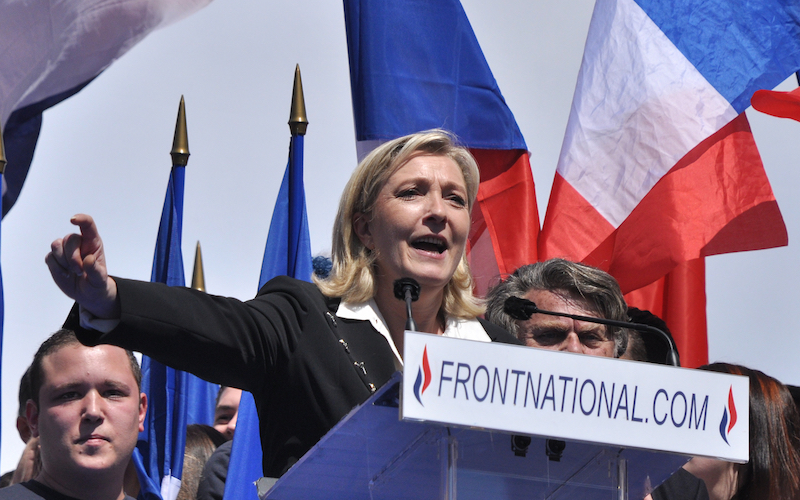
National Socialism is Alive in Europe
On July 10th, as members of Crimea’s 10,000-strong Jewish community gathered to pay homage to their ancestors massacred by the Nazis in 1942, they found the event had been taken up a notch. Being the first Remembrance Day, as the event is called, that has taken place in Russian-controlled Crimea, Moscow pulled out all the stops, financing the entire event and facilitating the arrival of rabbis and other visitors from around the world. One day earlier, President Putin himself even met with top rabbis from across Europe, thanking them for their constant struggle “against all manifestations of the Nazi ideology and any attempts to revive it.”
Critics of the Russian president denounce this heavily mediatized support of the Jewish community as opportunistic posturing, though few of Crimea’s Jews seem to mind. Anti-Semitic vandalism in the region had been increasingly commonplace as Ukraine slipped further into political instability earlier this year, including one incident where two pig heads were placed on a synagogue in Sevastopol.
Now, a Russian security detail protects the city’s monument to the Crimean Holocaust. Warnings against a neo-Nazi renaissance in Europe have long been part of the Kremlin’s talking points – points that critics dismiss as Russia’s attempt to justify its military action in Ukraine.
But what if there was some truth in these warnings? A revival of fascist tendencies is certainly against the interests of all countries, Russia and the United States included. Let us look at the facts on the ground.
Fascism, a French affair
France raised eyebrows earlier this year as the legislative and then European elections confirmed the dominant presence of the country’s right wing Front National (FN) party. The FN’s firebrand leader Marine le Pen has gone to great lengths to differentiate her party from other right-wing parties in Europe that clearly fall under the ‘neo-Nazi’ label. Her party is certainly one of the more moderate ones in the mix (though her father and Honorary Chairman of the party, Jean-Marie le Pen, recently caused uproar for suggesting a Jewish singer that was critical of him should be cooked in an oven – a clear allusion to the crematoriums of Dachau).
What is most worrying about the FN, though, is not only the constant stream of anti-Semitic outbursts from its members but its public policies. Best defined as ‘populist,’ the FN has devised a political platform composed of measures both from the nationalist right (military rearmament, anti-Americanism, stemming immigration…) and the socialist left (re-industrialization, trade tariffs, large-scale transfer of authority to the state). This potent political cocktail of nationalism and socialism is reminiscent of the most infamous National Socialist party. Fearful of economic crisis, the FN leads its followers to believe that outside forces such as the United States or the ‘Zionist media complex’ are the source of all problems and proposes a return to the state, the ‘nation,’ as a solution. As any lay historian is well aware, however, little good has ever come from ceding individual freedom to state in return for ‘security.’
Fed up with democracy
In the early 1930s, it was a prolonged economic crisis exacerbated by a series of inane technocratic governments that drove hordes of Germans from the Weimar Republic into the arms of the Nazis. For far too many Germans, democracy had come to mean nothing more than political and economic dysfunction. In this context, a strong state that promised material comforts for all and promised to restore national pride was appealing for many.
One doesn’t have to look far to see the parallels to European society today. Under the tutelage of the faux democratic European Union, which has imposed harsh austerity measures on countries such as Ireland, Portugal and Greece, citizens are feeling increasingly angered by their governments’ seeming inability to stand up for themselves. The general sentiment in these countries that one is suffering from poor economic decisions taken in Brussels upon which normal citizens have no say can only fuel nationalist sentiment and the desire for the state to seize more control.
In Greece, the openly racist Golden Dawn party, whose symbol looks like a mangled swastika, regularly decries cuts to public sectors jobs and undertakes large scale food distribution to any ‘ethnic Greeks,’ a move that says ‘if you the people grant us political power, we will take care of your needs.’ In May’s European elections, Golden Dawn gained 9% of their country’s vote, considerable for an explicitly neo-Nazi party that publicly carries out Hitler salutes during its marches.
Hungary is another case in point. In the May elections, far-right party Jobbik gained 15% of its country’s EU vote and 20% of the vote in Hungary’s April 2014 national elections. On their website, Jobbik blames “global capitalism” for the woes of poor Hungarians and “tailoring the economy through controls” (i.e. increasing regulation) is what will lead to an increase in living standards. What is needed is a “state capable of promoting national economic actors,” protecting “strategic national assets” and facilitating the “redistribution of wealth,” Jobbik argues. In Hungary as well, nationalism is married with socialist economic policies in a distinctly fascist blend.
Rather than being dismissed as outliers, these case studies should be seen for what they are: the seeds of a national socialism akin to the ideology that swept Germany in the 1930s. Europe and the United States would be wise to tend to this trend. As Santayana’s timeless adage goes, those who cannot remember the past are condemned to repeat it.

